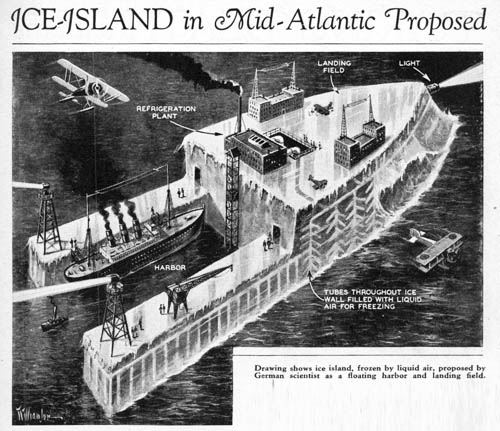 [Image: “Drawing shows ice island, frozen by liquid air, proposed by German scientist as a floating harbor and landing field”; via InfraNet Lab].
[Image: “Drawing shows ice island, frozen by liquid air, proposed by German scientist as a floating harbor and landing field”; via InfraNet Lab].
InfraNet Lab‘s new post on artificial ice islands—and the architectural use of ice as a building material for things like roads, drilling platforms, remote airstrips, and more—is absolutely fascinating and a must-read. Don’t miss it.
More on ice islands coming soon!
This reminds me of an interesting analogous construction from WWII era england – the invention of Pykrete (sawdust + ice) for building an unsinkable aircraft carrier (which was essentially a giant floating island – codename: Project Habakkuk)
A short article I found in Cabinet magazine gives some interesting background… although I admit I heard about this first on that most informative of shows 'Mythbusters', where they tested and built a 'Super' Pykrete speedboat in Alaska and ran it out on the frigid waters.
Jason, indeed – I love that Pykrete story. I actually included the Cabinet article you mention in the coursepack that I put together for my students; it's already come up several times in studio conversations.
This whole thing has been a lot of fun, actually!
I just now read both articles, both the Cabinet magazine one about Pykrete and the InfraNet Lab article about artifical islands. Fascinating stuff.
Somehow the transient nature of the ice islands reminds me of your post about an architecture of peace (https://bldgblog.blogspot.com/2010/02/post-conflict-architecture-and-design.html) where you mentioned bunker architecture. that too is a type of architecture intended to be impermanenet. the ice islands eventually melt of course, and bunkers will either get graffitied or converted into a new purpose (link to nick sower's blog on archinect) but I still like the comparison.
You'll find more on Pykrete at time.com in the archive.
What about ice islands (natural ones, in this case) as platforms for environmental commentary? Just came across this project involving placing large sculptures on icebergs that will inevitably be set adrift by the seasonal breakup of polar ice and – eventually, I presume – lost.